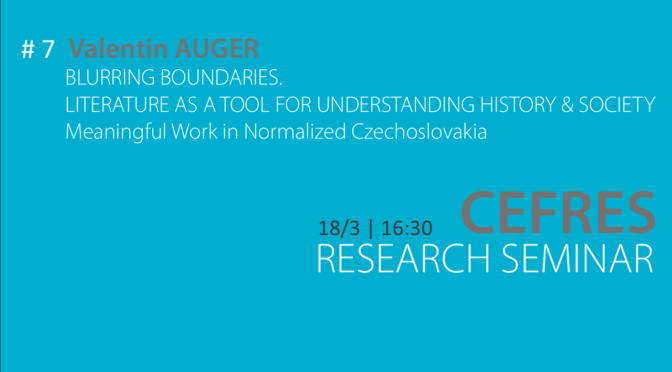Blurring Boundaries: Literature as a Tool for
Understanding History and Society.
Meaningful work during normalized Czechoslovakia
7th session of CEFRES in-house seminar
Through the presentation of works in progress, CEFRES’s Seminar aims at raising and discussing issues about methods, approaches or concepts, in a multidisciplinary spirit, allowing everyone to confront her or his own perspectives with the research presented.
Location: CEFRES Library and online (to get the link, write to cefres[@]cefres.cz)
Date: Tuesday, March 18, 2025 at 4:30 pm
Language: English
Valentin Auger (Faculty of Arts, Charles University, associated at CEFRES)
Chair: Jan Váňa (Institute of Czech Literature, Czech Academy of Sciences)
Abstract
The distinction between literature and history is a fairly recent development in the way we think about knowledge. For centuries, the two were deeply connected; historical narratives were shaped through literary forms, blending fact with storytelling. It wasn’t until the 19th century, with the rise of modern humanities and the influence of positivism and the methodological school (Langlois and Seignobos), that history started to define itself as a separate discipline. Historians wanted to break away from what they saw as the subjectivity of literary narrative and establish a more “scientific” approach. But this divide has never been absolute. Even today, historians use narrative techniques to make sense of events, and literature continues to offer unique insights into past societies, capturing emotions, mentalities, and social dynamics that traditional historical sources might miss.
In his chapter “From Nonfiction to Literature-as-Truth“, part of History Is a Contemporary Literature: Manifesto for the Social Sciences, Ivan Jablonka challenges the idea that history and literature exist in separate spheres. He argues that historical writing is never purely objective; it’s built on narrative choices and stylistic decisions that shape our understanding of the past. While history follows rigorous methods, it shares with literature a fundamental ambition: to convey truth, not just through facts, but through storytelling that captures the complexity of reality. Jablonka pushes us to rethink literature’s role, not as mere invention but as a powerful tool for accessing human and social truths that might otherwise remain invisible. His work calls for a fresh approach in the social sciences, one that acknowledges the literary dimension as an essential part of knowledge production rather than just decoration.
My doctoral research explores how literature helps us understand the meaning of work in Czechoslovakia during the normalization period (1971–1989). I focus on Czech and Slovak fiction translated into French, using theories of meaningfulness in work, especially those of Andrea Veltman, to examine how literature reflects and critiques labor under the communist regime. Through these stories, I look at the tensions between official ideology, personal experience, and professional aspirations, showing how fiction reshapes our perceptions of work in an environment marked by surveillance, stagnation, and adaptation.
Please find the complete program of 2024–2025 seminar here.

